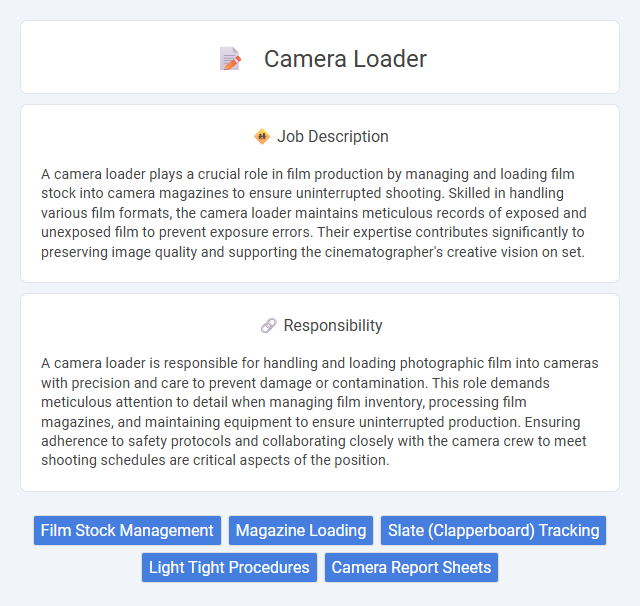
A camera loader plays a crucial role in film production by managing and loading film stock into camera magazines to ensure uninterrupted shooting. Skilled in handling various film formats, the camera loader maintains meticulous records of exposed and unexposed film to prevent exposure errors. Their expertise contributes significantly to preserving image quality and supporting the cinematographer's creative vision on set.
Individuals with strong attention to detail and the ability to work efficiently under pressure are likely suitable for a camera loader job. Those who may struggle with repetitive tasks or have difficulty maintaining focus might find this position challenging. The role probably requires physical stamina and reliability, making it more fitting for candidates who can handle consistent, precise work in a fast-paced environment.
Qualification
A camera loader must have a strong understanding of film stock types, film handling techniques, and the ability to operate loading equipment in low-light conditions to prevent contamination or damage. Professional qualifications include experience with 16mm, 35mm, or 65mm film formats, knowledge of synchronized film sound processes, and familiarity with on-set safety protocols. Certification in film handling, attention to detail, and excellent hand-eye coordination are critical for maintaining film integrity during production.
Responsibility
A camera loader is responsible for handling and loading photographic film into cameras with precision and care to prevent damage or contamination. This role demands meticulous attention to detail when managing film inventory, processing film magazines, and maintaining equipment to ensure uninterrupted production. Ensuring adherence to safety protocols and collaborating closely with the camera crew to meet shooting schedules are critical aspects of the position.
Benefit
A camera loader job likely offers valuable hands-on experience with film handling and camera operation, enhancing technical skills essential for cinematography. Exposure to professional set environments may increase chances of networking with industry experts and advancing in film production careers. Benefits probably include a dynamic work atmosphere and opportunities for creative collaboration.
Challenge
The camera loader job likely involves managing and handling sensitive film or digital media under tight deadlines, which can present significant challenges in maintaining accuracy and preventing damage. Workers probably face pressure to ensure seamless coordination with the production team to avoid delays during filming. The role may also demand quick problem-solving skills to address technical issues that arise unexpectedly on set.
Career Advancement
A camera loader plays a crucial role in film production by managing and loading film stock into cameras, ensuring smooth shooting processes. Mastery in this specialized technical function opens pathways to advanced roles such as camera operator, assistant camera, or digital imaging technician. Gaining experience with various camera systems and maintaining meticulous attention to detail significantly enhances career progression opportunities within the cinematography field.
Key Terms
Film Stock Management
Camera loaders are responsible for precise film stock management, ensuring the correct type and length of film is prepared for each shoot. They meticulously handle, label, and load film magazines to prevent exposure and contamination, maintaining the integrity of the footage. Expertise in inventory tracking and environmental storage conditions is critical to optimize film performance and limit waste.
Magazine Loading
Camera loader jobs involve precisely loading film magazines, ensuring each roll is handled in a light-tight environment to prevent exposure. Expertise in securing film spools, aligning perforations, and maintaining clean, dust-free conditions is critical for flawless magazine loading. Proficiency in managing various magazine types and formats enhances workflow efficiency and supports seamless camera operation on set.
Slate (Clapperboard) Tracking
Slate (Clapperboard) tracking is a crucial responsibility of the camera loader, ensuring accurate synchronization of audio and visual elements during post-production. The camera loader meticulously records slate information, including scene, take, and roll numbers, to maintain seamless continuity and efficient editing workflows. Mastery in managing and organizing slates enhances the precision of metadata integration in digital filmmaking.
Light Tight Procedures
Camera loader jobs require strict adherence to Light Tight Procedures to prevent film exposure and ensure image quality. These procedures include carefully sealing film canisters, inspecting camera magazines for light leaks, and handling film in dark or controlled environments to maintain light integrity. Mastery of Light Tight Procedures minimizes the risk of fogging and preserves the fidelity of captured footage.
Camera Report Sheets
Camera loader jobs involve efficiently organizing and managing camera equipment, emphasizing accurate documentation using Camera Report Sheets. These sheets record detailed information such as shot numbers, camera settings, lens types, and exposure data, ensuring seamless communication between the camera crew and post-production teams. Proper completion of Camera Report Sheets enhances workflow accuracy, reduces errors, and supports precise color grading and editing processes.
 kuljobs.com
kuljobs.com